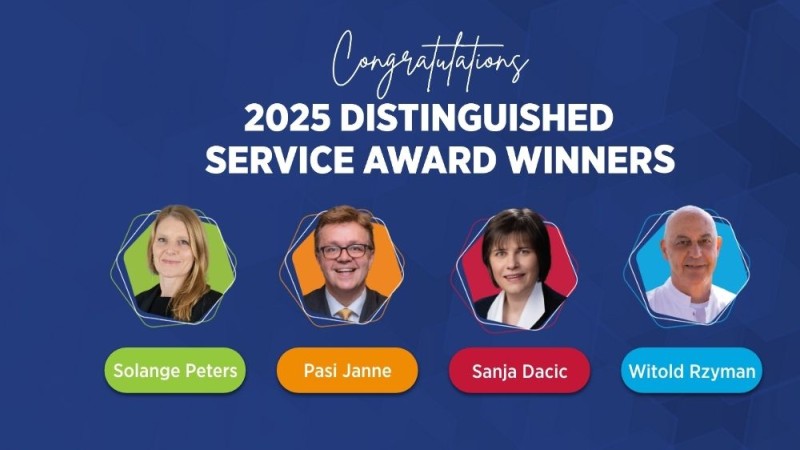
The IASLC Distinguished Service Awards recognize the "luminaries" in the field of lung and thoracic cancers- those who are further along in their careers and are more high-level in their field of work- for their outstanding contributions to the field and the IASLC.
On behalf of the IASLC Board of Directors, we thank you for your nominations for these important awards.
Paul A. Bunn, Jr. Scientific Award
The Paul A. Bunn, Jr. Scientific Award recognizes an IASLC scientist for a lifetime achievement of scientific contributions to thoracic cancer research. Dr. Paul Bunn’s studies set worldwide standards for the treatment of lung cancer and identified issues of natural history and biomarkers of prognosis and therapy selection. Robert Ginsberg, MD, a thoracic surgeon from Toronto, Canada, earned the first award in 1994 for his contributions to the surgical treatment of early stage lung cancer. Initially named the Scientific Award, the IASLC renamed the award in honor of Dr. Bunn after he served as its executive director and CEO for 10 years.
- 2024: Julie R. Brahmer
- 2023: Suresh Ramalingam, United States
- 2022: James Yang, Taiwan
- 2021: David P. Carbone, USA
- 2020: Joan Schiller, USA
- 2019: Charles Rudin, USA
- 2018: Charles Swanton, UK
- 2017: Tony Mok, Hong Kong
- 2016: Roy Herbst, USA
- 2015: Yi-Long Wu, China
- 2013: David R. Gandara, USA
- 2011: Nagahiro Saijo, Japan
- 2009: Bruce Johnson and Thomas J. Lynch, USA
- 2007: Frances Shepherd, Canada
- 2005: Thierry LeChevalier, France
- 2003: Paul van Houtte, Belgium
- 2000: Daniel C. Ihde, USA
- 1997: John D. Minna, USA
- 1994: Robert Ginsberg, Canada
The Adi F. Gazdar IASLC Merit Award
THE ADI F. GAZDAR IASLC MERIT AWARD
In 2019, the IASLC Board of Directors unanimously voted to elevate its recognition of Dr. Adi F. Gazdar to one of its highest honors by renaming the IASLC Merit Award for Dr. Gazdar. The Adi F. Gazdar IASLC Merit Award proudly recognizes and honors Dr. Gazdar’s lifelong dedication to lung cancer research through his pioneering work in molecular pathology. The recipient of the annual Adi F. Gazdar IASLC Merit Award is chosen by the IASLC Executive Committee and is announced and recognized at the annual World Conference on Lung Cancer.
- 2024: Kwun Fong
- 2023: Myung-Ju Ahn, South Korea
- 2022: Valerie Rusch, United States
- 2021: Michael Boyer, Australia
- 2020: Alex Adjei, USA
- 2019: Hisao Asamura, Japan
- 2018: Francoise Mornex, France
- 2017: Ramon Rami-Porta, Spain
- 2016: Keunchil Park, South Korea; Sumitra Thongprasert, Thailand
- 2015: Harvey Pass, USA
- 2013: James Jett, USA
- 2011: David Ball, Australia
- 2009: Giorgio V. Scagliotti, Italy
- 2007: Peter Goldstraw, UK
- 2005: Harubumi Kato, Japan
- 2003: Paul A. Bunn Jr., USA
- 2000: Desmond N. Carney, Ireland
- 1997: Heine H. Hansen, Denmark
- 1994: Norman Bleehen, UK; Yukio Shimosato, Japan
- 1991: Clifton F. Mountain, USA
Mary J. Matthews Pathology/Translational Research Award
The Mary J. Matthews Pathology/Translational Research Award recognizes an IASLC scientist for a lifetime achievement in pathology and translational research of thoracic malignancies. Dr. Matthews served as a senior investigator and pathologist at the National Cancer Institute’s Medical Oncology Branch. She was pioneer in the foundation of the histologic subtypes of lung cancer and the relationship between those subtypes and the clinical course of lung cancer. Geno Saccommano, MD, PhD, a physician and cancer researcher who dedicated his life to developing a pioneering technique to assist in the early detection of lung cancer was the first to receive the award in 1994.
- 2024: Erik Thunnissen
- 2023: Fernando Lopez-Rios, Spain
- 2022: Rafael Rosell, Spain
- 2021: Deepali Jain, India
- 2020: Caroline Dive, UK
- 2019: Andrew Nicholson, UK
- 2018: Ignacio Wistuba, USA
- 2017: Yasushi Yatabe, Japan
- 2016: Keith Kerr, UK
- 2015: Ming Tsao, Canada
- 2013: Tetsuya Mitsudomi, Japan
- 2011: Philip Hasleton, UK
- 2009: Masayuki Noguchi, Japan
- 2007: Fred R. Hirsch, USA
- 2005: Elisabeth Brambilla, France
- 2003: Adi Gazdar, USA
- 2000: Yukio Shimosato, Japan
- 1997: William D. Travis, USA
- 1994: Gene Saccomanno, USA
Joseph W. Cullen Prevention/Early Detection Award
The Joseph W. Cullen Prevention/Early Detection Award recognizes an IASLC scientist for a lifetime achievement in the prevention of thoracic malignancies. Dr. Cullen served as the Deputy Director of the National Cancer Institute’s (NCI) Division of Cancer Prevention and Control. He created the Smoking, Tobacco and Cancer Program at the NCI in 1982. The winner of the first award in 1994 was Jesse Steinfeld, MD, the U.S. Surgeon General when the National Cancer Act of 1971 was enacted into federal law.
- 2024: Claudia Henschke
- 2023: William Evans, Canada
- 2022: Edward F. Patz Jr., United States
- 2021: Gabriella Sozzi, Italy
- 2020 Pan-Chyr Yang, Taiwan
- 2019: Denise Aberle, USA
- 2018: Nise Yamaguchi, Brazil; Fadlo Khuri, Lebanon
- 2017: Carolyn Dresler, USA
- 2016: Ugo Pastorino, Italy
- 2015: Jacek Jassem, Poland
- 2013: Pieter Postmus, Netherlands
- 2011: John Field, UK
- 2009: Stephen Lam, Canada
- 2007: James Mulshine, USA
- 2005: Nigel Gray, Australia
- 1997: Clifford Douglas, USA
- 1994: Jesse Steinfeld, USA





